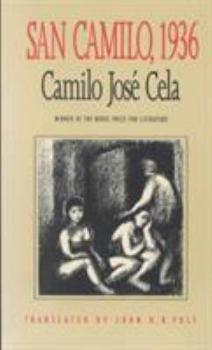San Camilo, 1936: The Eve, Feast, and Octave of St. Camillus of the Year 1936 in Madrid
Select Format
Select Condition 
Book Overview
Widely regarded as one of the best works by the winner of the 1989 Nobel Prize for Literature, San Camilo, 1936 appears here for the first time in English translation. One of Spain's most popular writers, Camilo José Cela is recognized for his experiments with language and with difficult subject matter. In San Camilo, 1936 , first published in 1969, these concerns converge in a fascinating narrative that is as challenging as it is rewarding, as troubling as it is compelling. A story of history as it happens, by turns confusing and startingly clear, echoing with news and rumors, defined by grand gestures and intimate pauses, the novel leads the reader into the ordinary life of extraordinary times. Beginning on the eve of the Spanish Civil War, San Camilo, 1936 follows a twenty-year-old student's attempts to sort out his private affairs (sex, money, career) in the midst of the turmoil overtaking his country. In vivid and richly textured prose that distinguishes Cela's work, the emotional reality of civil war takes on a vibrant immediacy that is humorous, tender, and ultimately transforming as a young man tries to come to terms with the historical moment he inhabits--and hopes to survive. Readers new to Cela will find in this novel ample reason for the author's growing reputation among audiences worldwide.
Format:Paperback
Language:English
ISBN:0822311968
ISBN13:9780822311966
Release Date:October 1991
Publisher:Duke University Press
Length:327 Pages
Weight:1.19 lbs.
Dimensions:0.9" x 5.8" x 9.2"
Related Subjects
Classics Contemporary Education & Reference Fiction Genre Fiction Historical Literature & FictionCustomer Reviews
1 rating
Cange of Attitude
Published by Thriftbooks.com User , 17 years ago
If this isn't too personal, when I gave up beer for fatherhood, I rediscovered my joy of literature. However, of my three favorite authors at the time, Twain, Traven, and McMurtry (early Mcmurtry was pretty darn good), I had read just about all there was. Where to turn to next? While pondering that question in 1989, I overheard on the news that Camilo Jose Cela had won the Nobel Prize for Literature. From that time on I have been an avid reader of most Nobel-Prize winning novelists and it all started with Cela. I remember all of my Spanish Lit professors had "La Familia de Pascual Duarte" on their shelves along with Cervantes and the usual suspects. I read that book and wanted more. However, Cela can be challenging. When I got a copy of "San Camilo, 1936" I was shocked to find that sentences were pages long and all the normal-lengthed chapters were one extended paragraph. Not the book to pick up with just a few minutes to spare. Reading Saramago helped cure me of the fear on endless sentences and paragraphs so I took "San Camilo, 1936" on a cruise recently. I read it and I'm glad I did. It was hard to stop in the middle of a page but I had plenty of lengthy times for reading. The book struck me as the caffein-induced thoughts of a young man. In the first chapter, his thoughts focussed on the local houses of ill-repute. In the second chapter, the focus was on the deaths of several women and one in particular. By the third chapter, I was starting to see a true focus developing. I came to appreciate "San Camilo, 1936" as a unique literary form where history and perspective emerges in the thoughts of this young man. All sex at first but then disturbing events begin to consume more of his thoughts. As the Nationaist rebellion begins, we understand how the Spanish mind began to absorb the increasing events in their lives. Our narrator shows through his thoughts how the rebellion gradually comes to the forefront of his focus. We see the characters, who were once just fellow citizens, break into factions and how the cause becomes greater than love and respect. It really worked well and I presume that this was what Cela wanted the reader to understand. The closing chapter is a brief one (but still one long paragraph) in which the author analyzes the Spanish mind and concludes with a plea for love. Cela is a bit more earthly with his concept of love but, then, he's been that way throughout the book. I found myself underlining a number of passages where, amidst the repetion, brilliant observations would emerge. I'm glad I've finally read "San Camilo, 1936". I'd read the brief dedication dozens of times over the years. If it's not against the rules, it's worth sharing; "To the conscripts of 1937, all of whom lost something; their life, their freedom, their dreams, their hope, their decency. And not to the adventurers from abroad , Fascists and Marxists, who had their fill of killing Spaniards like rabbits and whom no one had inv





